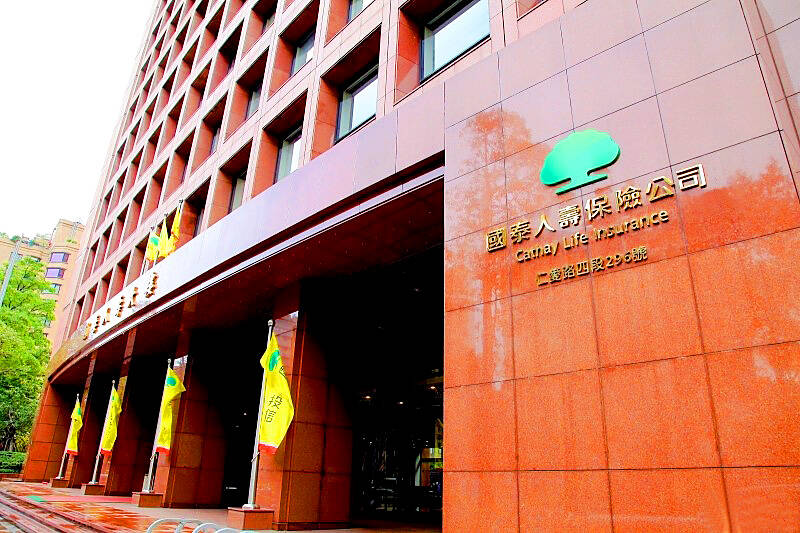Cathay Life Insurance Co (國泰人壽) yesterday said its after-hedging recurring yield is expected to hit a record high this year, in light of higher foreign bond yields and lower foreign-exchange hedging costs.
The profit engine of Cathay Financial Holding Co (國泰金控) saw its pre-hedging recurring yield reach 3.16 percent in the first half of this year, up from 2.84 percent a year earlier, due to rising yields for new foreign bonds amid rate hikes, it told an online investors’ conference.
Cathay Life said its cash dividend income would likely grow 10 to 15 percent this year from NT$20 billion (US$658 million) last year, as its equity investments have generated more dividends this year, in contrast to its focus last year on realizing capital gains by selling stocks, Cathay Life executive vice president Lin Chao-ting (林昭廷) told the conference.

Photo: Allen Wu, Taipei Times
Like bond yields, cash dividend income is a source of recurring yield for life insurers.
The life insurer said it registered a hedging gain of 0.21 percent for the first half of this year, translating into a gain of US$0.21 for every US$1 invested in assets denominated in foreign currencies.
The hedging gain was due to the insurer’s well-performing hedging strategy that helped offset hedging costs incurred in the use of more traditional hedging tools, such as currency swaps and non-deliverable forward, Lin said.
Cathay Life continued to see hedging gains last month, but whether it can maintain the gains during the second half would depend on market conditions, he said.
“Overall, considering our good pre-hedging recurring yield and the possibility of making hedging gains, we expect our after-hedging recurring yield to hit a record high this year,” Lin said.
From January to June, the life insurer made a net profit of NT$40.5 billion, the second-highest for the period, even though it was down 48 percent year-on-year due to a high comparison base last year.
Asked if the implementation of the International Financial Reporting Standards 17 (IFRS 17) would affect its financial strength, Cathay Life said its book value would expand under the new rules, citing internal calculations.
Under the IFRS 17, a life insurer’s assets and debts would be affected by changing interest rates, and Cathay Life found that rising interest rates would actually lead to a rise in its net worth, Lin said.
However, it is uncertain whether rate cuts would affect the book value contrarily, Lin said, adding that the company needs to do more calculations.

MULTIFACETED: A task force has analyzed possible scenarios and created responses to assist domestic industries in dealing with US tariffs, the economics minister said The Executive Yuan is tomorrow to announce countermeasures to US President Donald Trump’s planned reciprocal tariffs, although the details of the plan would not be made public until Monday next week, Minister of Economic Affairs J.W. Kuo (郭智輝) said yesterday. The Cabinet established an economic and trade task force in November last year to deal with US trade and tariff related issues, Kuo told reporters outside the legislature in Taipei. The task force has been analyzing and evaluating all kinds of scenarios to identify suitable responses and determine how best to assist domestic industries in managing the effects of Trump’s tariffs, he

TIGHT-LIPPED: UMC said it had no merger plans at the moment, after Nikkei Asia reported that the firm and GlobalFoundries were considering restarting merger talks United Microelectronics Corp (UMC, 聯電), the world’s No. 4 contract chipmaker, yesterday launched a new US$5 billion 12-inch chip factory in Singapore as part of its latest effort to diversify its manufacturing footprint amid growing geopolitical risks. The new factory, adjacent to UMC’s existing Singapore fab in the Pasir Res Wafer Fab Park, is scheduled to enter volume production next year, utilizing mature 22-nanometer and 28-nanometer process technologies, UMC said in a statement. The company plans to invest US$5 billion during the first phase of the new fab, which would have an installed capacity of 30,000 12-inch wafers per month, it said. The

Taiwan’s official purchasing managers’ index (PMI) last month rose 0.2 percentage points to 54.2, in a second consecutive month of expansion, thanks to front-loading demand intended to avoid potential US tariff hikes, the Chung-Hua Institution for Economic Research (CIER, 中華經濟研究院) said yesterday. While short-term demand appeared robust, uncertainties rose due to US President Donald Trump’s unpredictable trade policy, CIER president Lien Hsien-ming (連賢明) told a news conference in Taipei. Taiwan’s economy this year would be characterized by high-level fluctuations and the volatility would be wilder than most expect, Lien said Demand for electronics, particularly semiconductors, continues to benefit from US technology giants’ effort

‘SWASTICAR’: Tesla CEO Elon Musk’s close association with Donald Trump has prompted opponents to brand him a ‘Nazi’ and resulted in a dramatic drop in sales Demonstrators descended on Tesla Inc dealerships across the US, and in Europe and Canada on Saturday to protest company chief Elon Musk, who has amassed extraordinary power as a top adviser to US President Donald Trump. Waving signs with messages such as “Musk is stealing our money” and “Reclaim our country,” the protests largely took place peacefully following fiery episodes of vandalism on Tesla vehicles, dealerships and other facilities in recent weeks that US officials have denounced as terrorism. Hundreds rallied on Saturday outside the Tesla dealership in Manhattan. Some blasted Musk, the world’s richest man, while others demanded the shuttering of his